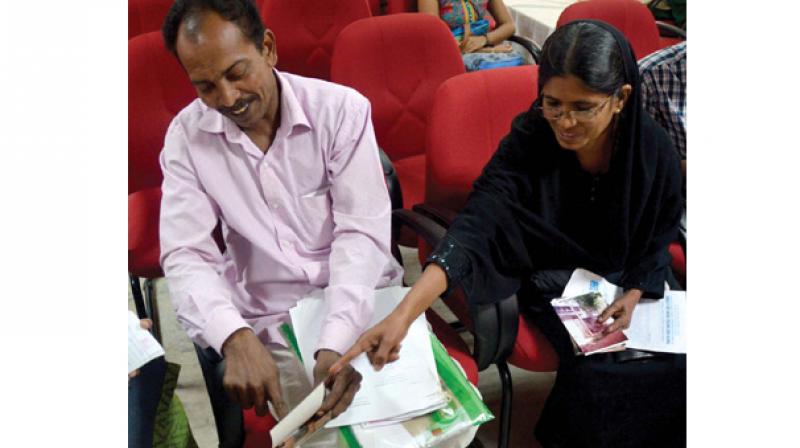Kerala Women's Commission plans more adalats to settle cases

Thiruvananthapuram: Kerala Women’s Commission had once ordered that DNA sample be taken from a dead body for a paternity test. Commission chairperson K. C. Rosakutty, whose tenure ends in March, shared about this peculiar incident in which the defendant committed suicide when a police summons was sent. It happened two years ago. “The defendant would never turn up for hearings, even though Commission sent out notices. Finally, a police summons had to be sent, receiving which the defendant committed suicide,” she told reporters at a Mega Adalat about cases where one of the two parties would be absent.
On Thursday, there were 33 such cases and 25 in which neither party was present. The commission was informed about the man’s suicide by the complainant, a scheduled caste lady whose son was in class X when the complaint was filed. The case is still dragging on in the court, but the decision to take DNA sample turned out to be a good one according to Ms Rosakutty. “When we heard of the death, we immediately alerted Medical College authorities, the district collector and the commissioner about getting DNA sample. However post-mortem was already conducted,” she said. The court would later ask her if she disrespected the dead.
“Fortunately, the doctor who conducted autopsy had, for study purposes, saved samples of heart tissues. Only a small sample was required. The test was conducted, and paternity was proven,” she said. She said that more mega adalats had to be conducted, as more women were filing cases. Some 122 cases were filed on Thursday, of which 47 were settled. Reports on 14 cases were sought from police stations. There will be another hearing in 33 cases. Counselling was suggested in three cases, and the report on two cases are pending.
Ombudsman’s order remains paper tiger
A couple from Poovar gramapanchayath have been forced to draw water from a well close to a septic tank, even as the Ombudsman for Local Self Government had issued an order to fill the tank. When the March 2015 order was issued, Naseema and Shajahan had thought justice was delivered. What did they know that it would remain a paper tiger. They were at the Women’s Commission’s Mega Adalat hoping for justice again. The ordeal started when their neighbour constructed a septic tank, toilet and kitchen work area close to their boundary wall.
In April 2010, they filed a complaint with the gramapanchayath seeking that the illegal constructions be demolished. In October 2010, an order was issued in their favour. Seeing that the neighbour did not bring it down, in 2011, they filed a case with Ombudsman, which was again in their favour. But even now the gramapanchayath officials have not taken any step to implement the order, Naseema says. When the gramapanchayath secretary Mini J was contacted, she said that she was waiting for a clarification from Local Self Government Department.
“The defendants had approached the government saying that the Chief Town Planner had recommended that their work area, toilet and septic tank can be regularised. They now have a government order saying the same. However the panchayath has not received any such recommendation from the Chief Town Planner. So we have asked the LSGD to respond,” she said. She said that the Health Inspector’s report said that the septic tank and the well did not maintain a distance of 7.5 m. “What can we do but drink that dirty water,” said Shajahan. The Commission has sought a report from Poovar gramapanchayath.
How powerful is Women’s Commission?
What happens when the Women’s Commission order is violated? Two complainants at the Mega Adalat conducted by Women's Commission shared their experience of orders being violated. A lady in her fifties, had come to the Mega Adalat to file a case for alimony. Two decades ago, when her children were in school, she had filed a similar case at the Commission. Within a year of her filing, the Commission issued an order asking her former husband to pay her '600 every month for the upkeep of two children. After seven years, the ex-husband stopped paying the alimony.
"I did not want to file another case. There was no one to support me then. I fought it alone," she said. She said that her younger son was born with a disability as she was physically assaulted by her husband when she was pregnant. Her daughter is a nurse, but is now unemployed. In the second case, Alias David, a retired army personnel, said that his daughter-in-law was forced out of their home by his wife.
The young lady filed a case with the Commission in 2015. The Commission issued in favour of the daughter-in-law. However, Alias David said that his wife and son did not do it. The Commission chairperson K.C. Rosakutty said that if the panel's order is violated, "complainants can inform the Commission and we would contact the implementing authority or individuals concerned. If they don't respond to our notices, the complainant will have to approach the Court. After all, we are just a mediating agency."

